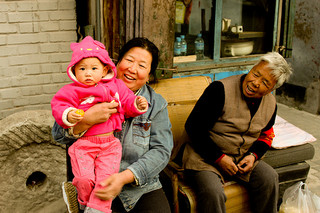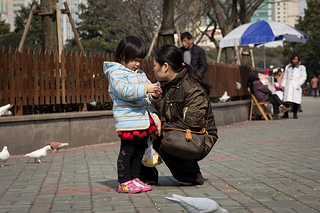By A. Nichols
Parenting is a great responsibility that comes with many choices and decisions to be made. Social scientists have speculated about and researched parental and family influence on child development for many decades. Parenting styles differ based on many aspects of culture. Different cultures tend to have different perceptions and goals of how to raise a child based on their past and their beliefs. The Chinese culture tends to refer to a more strict method of parenting, while Western parents have a more laid back technique of raising children. To both countries, children are the most important natural resource; but the outcome depends on how we treat them. Through exploring different ideas and techniques of parenting, one can make their own assumption about what the best way to raise a child is. Chinese and Western parents both have evidence that shows the effectiveness of their parenting styles, but one must analyze their reasoning for using those specific techniques and contemplate if that is the optimal for their cultural and familial situation.
Chinese parents pay special attention to training children and adhering to socially desirable and culturally approved behavior. Chinese parents tend to be much stricter. Many people wonder how Chinese parents raise such stereotypically successful children. Chinese parents believe that their children owe them. The reasoning behind this is based on the Confucian filial piety which is a guide for Confucian followers. This training concept is important in explaining the academic success of Chinese children. According to this philosophy, Chinese children must spend their lives repaying their parents, obeying their parents, and making their parents proud. A Chinese parent will disregard their child’s feelings if they do not agree with them. And yet, Chinese culture is not as punitive of children as Western culture. Although using a laid back tendency of parenting now, the “authoritarian” concept has evolved from an American culture and psychology that is rooted in both evangelical and Puritan religious influence. North American families have found that strong support from the spouses and friends may ease mothers’ stress in parent-child interaction, which allows them to respond more sensitively to their children’s needs, but Chinese mothers perceive that social support is not associated with their authoritarian parenting.
Children are the product of their cultural upbringing and are the most potent force in shaping the present and future of a nation. Parenting and parent-child interaction are influenced by the ecological context, which is mediated by society-wide changes and shifts in cultural values and child-rearing goals, as well as family-level life stress and social support. There are considerable individual differences in parenting styles. Parental influences on children’s development have been the topic of speculation for centuries and the focus of theory and research for decades. Although Chinese parents and Western parents may have different thoughts on the best way of raising a child, it is up to the individual set of parents to reflect on their goals and expectations of their children to decide what is the best parenting style for their circumstances.



